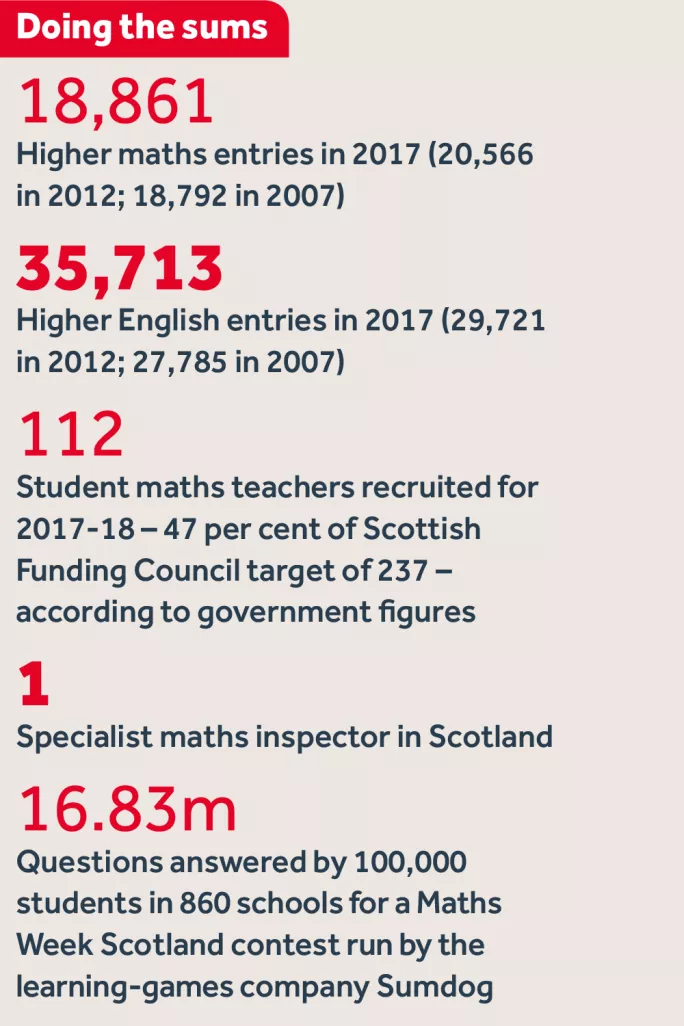Maths’ problems still adding up

Maths education in Scotland had a good year in 2017, on the face of it.
Its profile has never been higher, thanks largely to Maths Week Scotland, a frantic seven days of activity in September. Highlights included a maths contest in which 100,000 students took part, busloads of primary and secondary pupils pouring into university campuses to hear why maths matters - and a Royal Navy helicopter landing on Arbroath High playing fields, so that pilots could demonstrate the maths of aviation.
Maths Week Scotland will return this year, from 10-16 September, with the Scottish government keen for it to become an annual fixture. Scratch beneath the surface of excitement around this concentrated celebration of the subject, however, and those in the know say much remains to be done if maths is to have the impact it should.
A new report, published this week, provides a one-year review of Making Maths Count, the government scheme designed to stoke up children’s enthusiasm for maths and help teachers drive up performance in national qualifications. A group of influential figures in education oversaw the scheme and published a series of recommendations in 2016, including the setting up of Maths Week Scotland.
Their new report recognises the “buzz” the week created and reveals that it will be repeated this year, but warns that progress has not been as impressive in all other areas.
The report cautions that, despite plenty of good practice in schools and nurseries, there are “gaps” and calls for a “comprehensive assessment…to understand the national picture”, and for Education Scotland to share examples of good practice.

It suggests that maths is not always treated as the national priority it should be, with Education Scotland only providing “generic” ideas for raising the subject’s profile - and highlighting that there is only one specialist maths inspector in Scotland.
The report calls for “a more strategic and coherent approach” to using attainment data and inspection evidence to improve practice in maths, which it says should be developed and led by Education Scotland.
An Education Scotland spokesman says: “We are developing new ways of working as part of the wider package of reforms around the Regional Improvement Collaboratives. We will work to ensure the right support is available to teachers and schools across the country in order to continue to improve learning and attainment in numeracy and mathematics.”
Meanwhile, some authorities taking part in the Scottish Attainment Challenge - an attempt to help close disparities in educational performance between affluent and poorer children - have increased their focus on maths and numeracy, but this is “not yet universal”.
In both the Attainment Challenge and the Pupil Equity Fund, “numeracy is consistently and significantly the smallest element of the funding allocations and general proportion of attention”. The aim for every local authority to implement a strategy to drive up pupils’ awareness of maths’ importance in careers and everyday life “has proved less successful”.
Online test
There are also concerns about the maths skills of student teachers - it is suggested that applicants should take an online test of numeracy - and a recommendation that all education sectors promote career-long professional learning in maths. Difficulties in recruiting specialist maths teachers have become a well-publicised headache for the government.
In a letter sent to key figures in Scottish education, the chair of the National Profile-Raising Group for Mathematics, Maureen McKenna, says the one-year review showed signs of progress since the 2016 Making Maths Count report, “most notably…the resounding success of Maths Week Scotland”.
McKenna, president of education directors’ body ADES and a former maths teacher, met with education secretary John Swinney to discuss the findings last month and was encouraged by the support he showed.
A spokeswoman for the General Teaching Council for Scotland says that it is in early stages of reviewing entry requirements for student teachers, with revisions due this June. This will include considering the Making Maths Count group’s suggestion of raising minimum entry qualifications for maths to the same level as English - Higher or equivalent.
She adds that revised GTCS accreditation criteria for initial teacher education includes a greater focus on numeracy, “in order to ensure that all teachers, particularly primary teachers, are more confident and skilled in the teaching of maths”.
Chris Smith, a teacher who writes a weekly maths newsletter with several thousand subscribers, has been encouraged by “signs of positivity” around the subject recently. For example, the Scottish Mathematical Council has established an annual primary maths journal for the sector, to add to a secondary version that has been running for decades.
But Smith adds that there are “some genuine concerns about the disparity that is emerging between maths and English” under the new qualifications regime, in the number of students taking both subjects.
You need a Tes subscription to read this article
Subscribe now to read this article and get other subscriber-only content:
- Unlimited access to all Tes magazine content
- Exclusive subscriber-only stories
- Award-winning email newsletters
Already a subscriber? Log in
You need a subscription to read this article
Subscribe now to read this article and get other subscriber-only content, including:
- Unlimited access to all Tes magazine content
- Exclusive subscriber-only stories
- Award-winning email newsletters